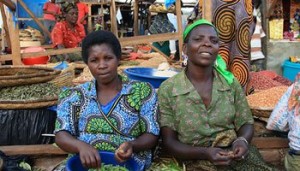 Women, who are the backbone of agricultural production in Africa, are not profiting nearly as much as they could from agroforestry – the growing of trees on farms – according to a recent study by the World Agroforestry Centre.
Women, who are the backbone of agricultural production in Africa, are not profiting nearly as much as they could from agroforestry – the growing of trees on farms – according to a recent study by the World Agroforestry Centre.
Gender and Agroforestry in Africa: Are Women Participating has found that women in Africa are more likely to participate in agroforestry that is considered to be their domain – and usually of little commercial value (such as the collection and processing of indigenous fruits and vegetables) – and less likely to be involved when it is related to areas considered male domain.
“Across Africa, men are migrating away from farms to earn money, making women more responsible for rural incomes,” explains Evelyne Kiptot, co-author of the study and Senior Research Scientist at the Kenya Forestry Research Institute. “Female-headed households account for 30% of all rural smallholder households in Malawi, half of households in Western Kenya and more than half in Zimbabwe.”
“Despite their important role in agricultural production women in Africa are still disadvantaged in the agricultural sector due to cultural, sociological and economic factors. They also tend to have limited access to resources and household decision-making.”
When it comes to marketing of agroforestry products such as indigenous fruits, women are usually confined to the lower end of the value chain (petty retailing) which limits their control over, and returns from, the productive process.
Encouragingly, the study did find examples where agroforestry is directly benefiting rural women, particularly tree products for subsistence use, such as firewood, soil fertility improvement and fruits.
“In some parts of Malawi, women are saving 15 to 180 minutes a day in labour time because they have access to homegrown fuelwood; freeing them up for other productive activities,” says Kiptot.
“In Tabora, Tanzania, women are earning between US$ 12 and US$ 30 per week through the sale of juice processed from indigenous fruits.”
“And in Cameroon, income from the vegetable Gnetum africanum is substantial with an average of US$ 2,629 per household per year.”
The study found that replenishing soil fertility through agroforestry practices is also attractive to women farmers because it involves low inputs but high returns. Apart from the obvious benefit of improving soil fertility, fertilizer trees provide fuelwood and reduce the incidence of weeds.
While women’s involvement in agroforestry is fairly high in terms of proportion of female-headed households participating, it is low as measured by the area allocated and the number of trees planted.
The study looked at women’s rights to trees in Africa and found they are mostly confined to by-products of men’s trees. But there are some species which women have rights, and/or access to. Among the Luo and Luyha of western Kenya, Sesbania sesban, which is good for fuelwood and soil fertility improvement, is considered a woman’s tree and they have the authority to plant, manage, use and dispose of it as they please. Ibo women of southeastern Nigeria own economic trees such as palm oil as reward for their ability to bear children. In West Africa, certain fruit trees are planted and processed by women, including bush mango, bread fruit and the oil bean tree.
In the recently published State of Food and Agriculture 2010-11 the UN’s Food and Agriculture Organization (FAO) says reducing the gender gap in agriculture and rural employment will not only benefit women but also increase agricultural productivity and stability. “Armed with the same resources as their male counterparts, women farmers could increase their yields by 20 to 30 percent. This increase in production has the potential of increasing women’s income as well as reducing the number of hungry people worldwide by 12 to 17 percent,” the report claims.
Kiptot and Steven Franzel, co-author and Principal Agricultural Economist at the World Agroforestry Centre, believe there is far greater potential for agroforestry to improve the situation of rural women, and they make several technical, policy and institutional recommendations.
In many cases, agroforestry requires fewer resources, particularly land and capital, than alternative enterprises,” Franzel says.
One of the main recommendations is for women to have greater access to information and training, the targeting of women’s groups and facilitation of women to form and strengthen associations. “Extension services are currently mainly aimed at men, so deliberate gender-sensitive interventions are needed.”
“In Kenya, specifically targeting women farmers with a program to grow fodder shrubs that increase milk yields of dairy cows and goats has helped raise the proportion of women beneficiaries to about half,” explains Franzel. “These women are earning greater incomes and using this money to pay school fees and improve the nutrition of their families.”
Similarly, for women to benefit from markets, deliberate effort must be made by governments and NGOs to specifically link women with markets and industry. By engaging in collective action women can also gain a more powerful position in the value chain.
For women to compete favourably and also have an edge, they must diversify into high value new products such as oil, soap, juices, body lotions, wine, and leaf meal. This can often be done using the same raw materials.
The study recommends activities such as participatory tree domestication that enables tree products to be grown on the farm, especially those that may be scarce in the wild. Technologies for improving the postharvest quality of ripened fruits would also be of value to women.
“An enabling policy environment is critical to making sure agroforestry benefits women,” says Tony Simons Deputy Director General at the World Agroforestry Centre. “Women in sub-Saharan Africa are trapped at the production end of the value chain. It is imperative that policy makers, NGOs, training institutions and the private sector get behind successful gender-inclusive technologies if we are to improve the livelihoods and food security of poor farmers who are mainly women.”
The research, which examined 104 studies of gender and agroforestry, has been published as Occasional Paper 13: Gender and Agroforestry in Africa: Are Women Participating?

.jpeg&w=60&q=100&h=60)




.jpeg&w=60&q=100&h=60)





